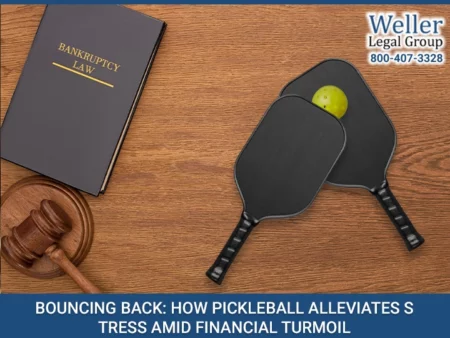
In a world that often correlates financial stability with success, facing bankruptcy can be an emotionally draining ordeal. The stress, anxiety, and uncertainty that accompany financial hardships can take a toll on one’s mental health. However, engaging in recreational activities like pickleball can serve as a remarkable stress reliever during such challenging times. This article delves into the mental health benefits of playing pickleball and its potential to alleviate stress amid financial crises such as bankruptcy.
Unveiling the Pickleball Charm
Pickleball, a paddle sport that amalgamates elements of tennis, badminton, and table tennis, has witnessed a surge in popularity owing to its social and physical benefits. Its simplicity and the minimal equipment required make it a budget-friendly option for those navigating the rough waters of financial instability. But beyond its low cost of entry, pickleball offers a myriad of mental health benefits that are particularly beneficial during stressful times.
The Mind-Body Connection
Engaging in physical activities like pickleball triggers the release of endorphins, the body’s natural mood lifters. Moreover, the rhythmic, repetitive nature of the game can foster a meditative state, where financial worries are momentarily set aside, allowing individuals to revel in the present moment.
Social Interaction and Support
Pickleball is inherently social. At a time when financial woes can foster feelings of isolation and embarrassment, the communal aspect of pickleball provides a sense of belonging. The camaraderie on the court can lead to friendships off the court, creating a support network that can be invaluable during tough financial times.
Cognitive Resilience
The strategic thinking and quick decision-making required in pickleball can also enhance cognitive resilience. By promoting mental agility and focus, pickleball can help individuals better manage the stress and anxiety associated with financial hardships.
A Budget-Friendly Escape
For individuals facing bankruptcy or other financial hardships, the cost of recreational activities can be a deterrent. However, pickleball’s low cost provides an accessible outlet for physical exercise and social interaction. It’s an escape that doesn’t exacerbate financial strain.
Learning Financial Lessons on the Court
Interestingly, the strategies employed in a game of pickleball can mirror those needed to navigate financial hardships. The patience, strategic planning, and adaptability required on the court can translate to valuable financial life lessons off the court.
Community Initiatives
Several community centers and local pickleball clubs recognize the sport’s potential to foster well-being and have initiated programs aimed at supporting individuals facing financial or other life challenges. These programs often include free or low-cost access to pickleball courts and equipment, making the sport accessible to all, regardless of financial status.
Concluding Thoughts
Financial hardships like bankruptcy can be incredibly taxing, both emotionally and mentally. However, simple, accessible, and engaging recreational activities like pickleball can offer a much-needed respite. The mental health benefits derived from the rhythmic swings, social interactions, and strategic gameplay of pickleball can serve as a balm for the stress and anxiety that often accompany financial woes. As communities continue to embrace the inclusive and therapeutic nature of pickleball, individuals facing financial hardships have an opportunity to find solace and support on the pickleball court. Through the seemingly simple act of striking a ball across a net, individuals can find a momentary escape from financial stress, a community of support, and perhaps, a path toward healing and resilience.
Picture Credit: Freepik

